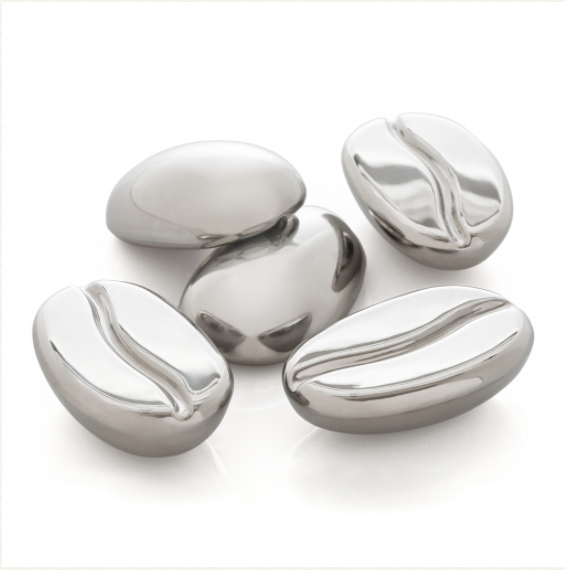
We love how many brainiacs there are in the specialty-coffee community who have ideas others might think are wild and crazy, but who forge ahead with confidence that they can make their dreams a reality. The two Daves who invented Coffee Joulies are some of those brains.
Dave Petrillo and Dave Jackson grew up across the street from one another in Pennington, N.J., where they spent their childhood days building kite buggies, robots, and chainsaw-powered scooters. Both fell in love with coffee as adults, and both became deign engineers. Now one Dave lives on the East Coast, and the other out west, but they’re still good friends, and they still like making cool things together.

They came up with the idea for Coffee Joulies to solve for two problems they were having with coffee: 1) It was often too hot to drink, and 2) Even if it started too hot, it always cooled down too fast. Here’s how the Daves explain it:
Coffee Joulies are designed to improve the temperature profile of your hot beverage and improve your overall experience. To achieve this, they do two things:
Absorb heat to cool down coffee fast – To solve the problem of coffee being too hot at first, Joulies absorb heat from hot coffee and store it in something called ‘Heat of Fusion’ – more on this later. Only heat that is absorbed while the coffee is above 140F (60C) will be able to be released back into the coffee later. This is due to how PCM’s work. How much heat is absorbed, and how fast, also depend completely on the conditions Joulies are used in. See the FAQ for more information on different containers.
Release heat to keep coffee in the perfect temperature range for longer – Once the coffee is below 140F any extra time that coffee would have been too hot is now extra time that you get to enjoy your coffee at the perfect temperature. The total amount of time before your coffee gets cold is dependent entirely on how well insulated of a container you use.

I didn’t get it until I held a Coffee Joulie in my hand: It’s not solid stainless steel, as you might think it is when you first see it. It’s actually lightweight because the material inside it is actually the substance that does the job of cooling and then maintaining a temperature. The Daves are the science guys, so I’ll let them explain it:

This is what the inside of a Coffee Joulie looks like (above photo). The white stuff is PCM or œphase change material which is a complicated way of saying.. ‘something that melts.’ The silver is the stainless steel shell, it’s cut in half to show the inside. When Joulies are heated to over 140f (60C), the white stuff turns into a clear runny liquid.
The point of Joulies is to get a material with a high heat of fusion into your coffee cup, and substantially improve the temperature profile of your coffee. We’ve worked very hard to design the most efficient and effective device to achieve this simple goal, and given the constraints of material selection, design, and usability, we’re extremely happy with the result. I mean, look at it, jam packed with sweet temperature regulating PCM!
The Daves are super committed to Coffee Joulies, and they’ve done a bang-up job of getting the message out there. They were even featured on the ABC TV show Shark Tank! Check out the episode HERE.

The Daves have also anticipated just about every question you could have about Coffee Joulies, and answered them HERE.
But really, I think you can’t get a full understanding of Coffee Joulies until you try them yourself. They retail for about $50 per set, and you can buy them HERE. And guess what? The Daves are so confident you’ll like them that there is a money-back guarantee.
Man, I love this industry. So many dreamers.

